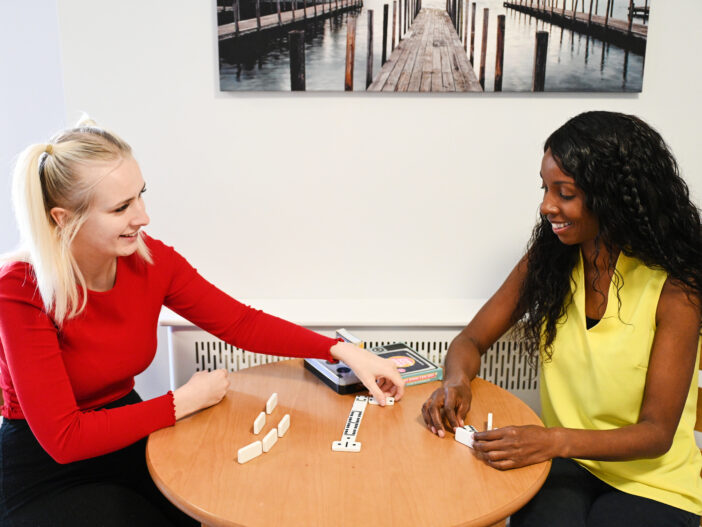Loraine and Aneil: Understanding Prader-Willi syndrome
To mark Prader-Willi syndrome awareness month, we spoke to Loraine, Service Manager at Redbank House and Aneil a resident of the care home. Redbank House is one of our Prader-Willi syndrome specialist service and our CQC rated Outstanding services!
What is Prader-Willi syndrome?
Prader-Willi syndrome is a very rare genetic condition affecting approximately 2000 adults in the UK. The syndrome is caused by a defect of chromosome 15 and can have a significant impact on a person’s mental, physical and behavioural well-being.
Loraine told us how Prader-Willi syndrome affects people, “Over the years I have so often met people who say, ‘it’s an eating disorder isn’t it?’ – to a certain extent, yes, but it is so much more than that. Prader-Willi syndrome is a chromosomal abnormality affecting the 15th chromosome. People with Prader-Willi syndrome are affected in so many ways. Most people are aware of the lack of satiety response: the message telling them they are full after food is not apparent, therefore, their hunger never dissipates.”
Symptoms of Prader-Willi syndrome vary from person to person, some people can only process small amounts of information.
Lorraine continues, “Some people who have Prader-Willi syndrome can appear to cope very well in social situations and communicate easily. However, from one individual to another, there is may be an emotional disconnect: an inability to read emotion in others and furthermore not understand what they themselves are feeling.”
There may also be behavioural difficulties. But with the right support, those with Prader-Willi syndrome can be supported to live their best lives. Loraine explains, “Prader-Willi syndrome is such a complex disability. Before coming to work at Redbank House, I had never heard of it. I have now been working with individuals with Prader-Willi syndrome for 12 years. There is never a dull day, every day we learn more about Prader-Willi syndrome and the affects it can have on the people we support.”
The importance of understanding the syndrome
Aneil is 41 and was diagnosed with Prader-Willi syndrome when he was just three years old. As a child, he struggled at school. “I remember this as being quite a difficult time for me, people did not understand my needs or why I behaved the way I did. I used to get very frustrated and angry because people just didn’t understand me.” Aneil explained.
He then attended a boarding school, where other pupils unfortunately bullied him due to his weight. Because those around him didn’t understand Prader-Willi syndrome, Aneil had easy access to food and gained weight. Even in residential care, he would find ways to get more food. The support he was receiving wasn’t right for his needs.
“Redbank House are another family to me”
Once Aneil moved to Redbank House, staff co-created a support plan to suit his specific needs. “Everybody wanted to know me, wanted to help me and we all worked together, I’m happy now!” Aneil said. “Redbank House is good for me because I cannot get extra food, the locks on cupboards take the pressure of temptation away. Meals and snacks are regular, and the food is great!”
Aneil also explained that staff discuss things like meals and the importance of healthy eating with him. “Staff try to understand me and help me. Redbank House are another family to me.”
Learn more about how we support people with Prader-Willi syndrome
Those living with Prader-Willi syndrome can still lead a healthy fulfilling life when they have consistent support from people who understand the condition.
If you’d like to learn more about how we support people with Prader-Willi syndrome, please visit our Prader-Willi syndrome webpage.

 News & events
News & events 

